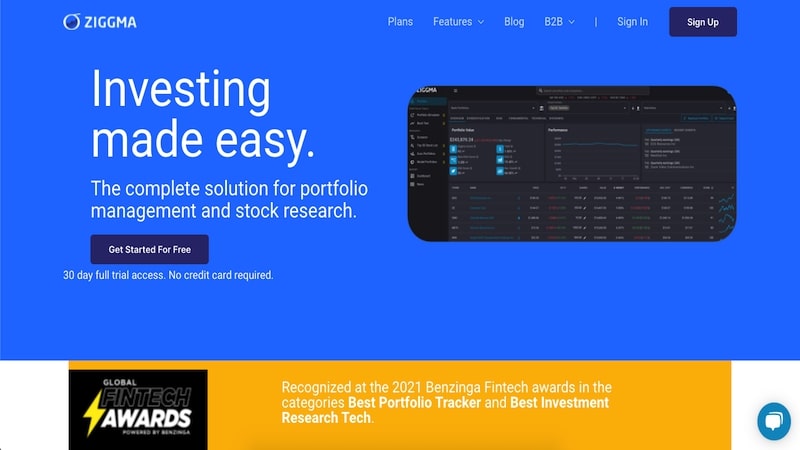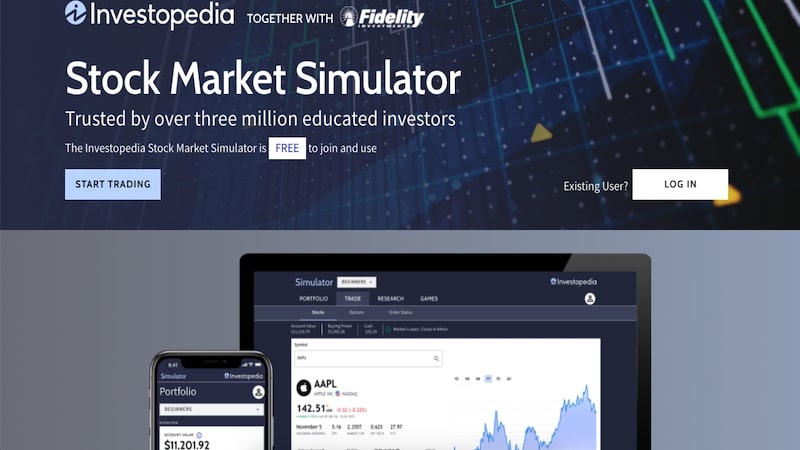7 Best Stock Market Simulators

For most people, investing in the stock market is exciting and nerve-wracking. Luckily, the best stock market simulators can help reduce investing-related stress.
Stock market simulators (also called trading simulators) allow you to test your investment strategies without risking losing any real money.
If you are intrigued, learn how trading simulators can help you develop the best investing strategy for your needs.
*Please note that these recommendations are listed in random order, not by recommendation. The simulator you use should be based on personal experience and other factors.
Table of contents
Top Stock Market Simulators
Each of these stock market simulators is set up to resemble the real stock market, giving you investing experiences that closely mimic actual results.
1. Ziggma

Ziggma was created to help investors manage their investment portfolios. Within Ziggma’s set of management tools is a stock market simulator.
The platform offers both a free account and a premium option. However, the free account doesn’t include the portfolio simulator.
A premium account costs as low as $6.99 per month if you pay annually. To use this simulator, you must open an account and link it to your investment portfolio. Think of Ziggma as sort of the Empower of investing.
The simulator helps you see the potential impacts of your investment choices. It also has a backtesting feature that lets you create “what if I had” scenarios.
Best for: Investors interested in portfolio management features
Pros
- Affordable for almost any income level
- Multiple features, including backtesting
- Portfolio management tools included
Cons
- No free simulator access
- Need to link your investment account
2. Warrior Trading
Warrior Trading is primarily geared toward day traders. If you’re new to investing, check out their Trading Terminology page.
The platform has two paid subscription plans, Warrior Starter and Warrior Pro. Warrior Starter is a 30-day membership meant to help you learn and transition into a Warrior Pro membership.
If you want to determine if day trading is for you, the Warrior Starter plan is the way to go. It is advertised as an “essential trading education program for beginners” and costs $997.
The Warrior Pro program includes unlimited access to Warrior Pro Masterclass courses, live trading room chat access, mentor sessions and more. It costs $5,997 annually.
Warrior Trading’s stock market simulator can be purchased as an add-on to either of these two programs. You’ll pay $99 per month for the simulator and start with $200,000 of virtual cash to trade with.
Best for: Investors interested in day trading who can pay the course fees
Pros
- Includes comprehensive training programs and courses
- Stock market simulator partnered directly with NYSE and NASDAQ
- Real-time Level 2 quotes and instant order execution
- Advanced performance reports
Cons
- Expensive
- Training is focused on day trading, a higher-risk form of investing
3. MarketWatch Virtual Stock Exchange (VSE)
The MarketWatch VSE is a free stock simulator that allows you to build your portfolio and watch the markets react in real-time. It’s a customizable game that allows you to set your budget and perform a variety of market moves.
You can allow or disallow short selling, margin trading, and more. Registering to use MarketWatch’s VSE, you can join a game or create your own. You can also invite others to compete against you to see whose strategy comes out on top.
One of the great things about the platform is that you can use MarketWatch’s extensive educational library to learn about the market as you make your investment choices.
MarketWatch VSE also has a community where you can discuss investments and see how others invest.
Pros
- Suitable for any type of investor
- Free to use
- Allows you to join an existing game or create your own
- Option to compete with family and friends
Cons
- No trading of options
- Registration required
Best for: Investors who love a little competition
4. Thinkorswim
Thinkorswim is a trading platform owned by Schwab. It offers many real-life trading options and a simulator. You can use the Thinkorswim simulator if you are a current Schwab customer or open an account to become one.
You’ll get $100,000 in virtual cash to use with your Thinkorswim simulator. It’s easy to use the “add simulated trades” button to test as many strategies as possible.
With Thinkorswim, you can practice trading stocks and commodities. Options and futures contracts are also available, and real-time quotes are available upon request.
Thinkorswim covers all the bases of a simulator, from educating clients to giving them access to life-like experiences with its simulator. As a result, it is great for all levels of investors.
Pros
- Allows virtual investing for everything from stocks to forex
- Free to use for TD Ameritrade customers
- 60-day trial for non-customers
- Caters to beginning and experienced investors
Cons
- Must have a TD Ameritrade account to use long-term
Best for: Any investor, but is especially beneficial for new investors
5. Investopedia Stock Simulator

The Investopedia stock simulator is free and gives you $100,000 in virtual cash to play with on the stock market.
It has an excellent community component where you can connect with over 700,000 other investors to share ideas and glean information.
Investopedia’s simulator lets you trade U.S. listed stocks and ETFs. It also gives you the ability to buy options.
This simulator offers a delayed data feed and is off from the real market by about 20 minutes. However, it’s one of the easiest simulators to use and can be an excellent choice for new investors.
Pros
- A wide range of educational articles is available
- Free to use
- Easy to use for new investors
Cons
- Delayed data feed instead of real-time
- No charting
Best for: Those looking for a community of investors to learn from
6. HowTheMarketWorks
HowTheMarketWorks was one of the first stock market simulators invented. Users can open a free account and start with $100,000 in virtual cash.
This simulator has an education section with various articles geared toward both beginner and advanced investors.
Some stock and ETF quotes are real-time on the game, but others have a 15-20 minute delay. You can join an existing game or create your own and invite family and friends.
Furthermore, a Teacher Tools section allows you to create accounts for your class and work on investment education together if you are an educator.
Pros
- Comprehensive educational tools
- Free to use with registration
- Real-time trading simulation in most cases
- Teacher/classroom tools
Cons
- No options, futures, or commodities trading
Trustpilot score: N/A
Best for: New traders who are just getting involved in investing
7. TradeStation

TradeStation’s simulator is free to use when you open a TradeStation brokerage account or purchase a TradeStation Analytics Software subscription.
If you open a brokerage account, you can choose between the TS Go and TS Select accounts. Each account has different features and benefits.
TradeStation Analytics Software subscriptions start at $99 per month. Remember that the TradeStation simulator is more geared toward day traders than long-term investors.
Newer investors will enjoy the learning tools but need to be prepared to put in some study time.
Pros
- Several community forums
- Intuitive mobile app available
- Real-time numbers
Cons
- No free account options
- It might be too costly for many investors
- Geared toward day traders
Best for: Day traders and experienced investors
Key Features of Stock Trading Simulators
Here are some features to look for when searching for a stock simulator.
Real-Time Market Resemblance
The stock market simulator you use should resemble the actual stock market very closely. Testing investment strategies on simulators that don’t closely resemble the real market will result in skewed returns.
Educational Tools
The best stock market simulators have a host of educational tools available to users. This feature is especially vital if you’re new to investing.
Consequently, you should look for simulators that focus heavily on education, especially if you are a newer investor.
Multiple Investing Options
Unless you’re testing one or two specific strategies, your stock market simulator should offer a wide variety of investing options.
It’s beneficial to use simulators that will allow you to test investing in everything from stocks to forex to commodities and more.
Frequently Asked Questions
Before you choose a stock market simulator, it’s important to get all your questions answered. Here are some commonly asked questions about this type of investing tool.
How much does it cost to use a stock market simulator?
Stock market simulators range in price from free to quite expensive. Look at plans and prices to help determine the right simulator for your needs and your budget.
What is the best stock market simulator?
This depends on each individual user. Every simulator is unique, and each user has different likes, dislikes, and goals.
Fortunately, there are simulators that cater to investors of all experience levels and that offer all types of investments. One great option is Thinkorswim.
Are stock market simulators safe to use?
The stock market simulators we mention here are safe to use. They use fictitious funds.
While some will cost you real money in the form of fees, you won’t use real money to invest.
If you decide to invest money in the stock market using the strategies you tried with the simulator, do exercise caution. There is no guarantee you will have the same results.
How Do The Stock Market Simulators Compare?
| Company | Trustpilot |
| Warrior Trading | 4.9 |
| MarketWatch Virtual Stock Exchange | N/A |
| Thinkorswim | 3.4 |
| Investopedia Stock Simulator | 4.0 |
| HowTheMarketWorks | N/A |
| TradeStation | 1.6 |
| Ziggma | N/A |
Summary
A stock market simulator can be a great way to learn more about investing if you are a beginner. It can also be an excellent way to test your personal investment strategies or ones recommended by others.
It can be wise to try investment strategies using a stock market simulator before investing your real, hard-earned cash in the stock market.
Choose the best simulator for you by evaluating your needs and budget, then start practicing to increase your confidence in investing.
Recommended Reading
- 8 Top Portfolio Analysis Tools
- Thinkorswim Review: Is This Trading Platform Worth It?
- 10 Stock Screeners To Evaluate Stock Picks (Paid and Free Options)
- Vanguard Personal Advisor Services Review
- 15 Top Investment Sites (For Research, Advice & News)
3 Best Stock Market Simulators: What They Are and How They Work
Stock market simulators let you try out new investing strategies with no real money on the line.

Many, or all, of the products featured on this page are from our advertising partners who compensate us when you take certain actions on our website or click to take an action on their website. However, this does not influence our evaluations. Our opinions are our own. Here is a list of our partners and here’s how we make money.
The investing information provided on this page is for educational purposes only. NerdWallet, Inc. does not offer advisory or brokerage services, nor does it recommend or advise investors to buy or sell particular stocks, securities or other investments.
Updated Jul 15, 2025 · 3 min read
Fact Checked
How is this page expert verified?
NerdWallet’s content is fact-checked for accuracy, timeliness and relevance. It undergoes a thorough review process involving writers and editors to ensure the information is as clear and complete as possible.
Written by
Dayana Yochim
Dayana is a former NerdWallet authority on investing and retirement. She has written for The Associated Press, The Motley Fool, Woman’s Day, Real Simple, Newsweek, USA Today and more. She has written and contributed to several personal finance books and has been interviewed on the “Today” Show, “Good Morning America,” NPR, CNN and other outlets.
Pamela de la Fuente
5 years of experience
- Consumer Credit
- Debt
- Taxes
- Retirement
- Underrepresented communities
Pamela de la Fuente leads NerdWallet’s consumer credit and debt team. Her team covers credit scores, credit reports, identity protection and ways to avoid, manage and eliminate debt. Previously, she led taxes and retirement coverage at NerdWallet. She has been a writer and editor for more than 20 years.
Pamela joined NerdWallet after working at companies including Hallmark Cards, Sprint Corp. and The Kansas City Star.
She is a thought leader in content diversity, equity, inclusion and belonging, and finds ways to make every piece of content conversational and accessible to all.
She is a graduate of the Maynard Institute’s Maynard 200 program, and was a presenter at the National Association of Black Journalists convention in 2023. She is a two-time winner of the Kansas City Association of Black Journalists’ President’s Award. She is also a founding co-chair of NerdWallet’s Nerds of Color employee resource group.
Pamela is a firm believer in financial education and closing the generational wealth gap . She got into journalism to tell the kind of stories that change the world, in big and small ways. In her work at NerdWallet, she aims to do just that.
Managing Editor
Co-written by
Pamela de la Fuente
5 years of experience
- Consumer Credit
- Debt
- Taxes
- Retirement
- Underrepresented communities
Pamela de la Fuente leads NerdWallet’s consumer credit and debt team. Her team covers credit scores, credit reports, identity protection and ways to avoid, manage and eliminate debt. Previously, she led taxes and retirement coverage at NerdWallet. She has been a writer and editor for more than 20 years.
Pamela joined NerdWallet after working at companies including Hallmark Cards, Sprint Corp. and The Kansas City Star.
She is a thought leader in content diversity, equity, inclusion and belonging, and finds ways to make every piece of content conversational and accessible to all.
She is a graduate of the Maynard Institute’s Maynard 200 program, and was a presenter at the National Association of Black Journalists convention in 2023. She is a two-time winner of the Kansas City Association of Black Journalists’ President’s Award. She is also a founding co-chair of NerdWallet’s Nerds of Color employee resource group.
Pamela is a firm believer in financial education and closing the generational wealth gap . She got into journalism to tell the kind of stories that change the world, in big and small ways. In her work at NerdWallet, she aims to do just that.
Managing Editor
There’s nothing wrong with a little friendly investing competition. Especially when none of your actual money is on the line. Enter stock simulators.
What are stock simulators?
Stock market simulators allow you to invest with fake money, also known as “paper trading.” Stock simulators let you test out different investing strategies, such as options trading.
Best stock market simulators
For a practice investing environment, you can’t get much better than the platforms offered by actual online brokerages.
The best brokers give paper traders access to the same tools active traders use: watch lists, stock screens, research and live data feeds. Most stock market simulators are free, though they may require you to set up an account.
Of the brokers that NerdWallet reviews, here are the top stock market simulators within paper trading accounts:
1. Interactive Brokers
NerdWallet’s ratings are determined by our editorial team. The scoring formula for online brokers and robo-advisors takes into account over 15 factors, including account fees and minimums, investment choices, customer support and mobile app capabilities.
Learn More
on Interactive Brokers’ website
Interactive Brokers, or IBKR, scores the highest out of all the brokers we reviewed this year. What makes IBKR unique is that it allows you to practice with all the investments the broker offers. Many stock market simulators only allow you to practice with certain investments, such as stocks, options and ETFs. IBKR is an excellent option for advanced traders looking to hone their skills. Beginners may want to look elsewhere as IBKR’s platform may feel a little overwhelming, and unlike some others, you’ll need an IBKR account before you can use the simulator. IBKR gives you $1 million in fake money to practice with.
2. Webull
NerdWallet’s ratings are determined by our editorial team. The scoring formula for online brokers and robo-advisors takes into account over 15 factors, including account fees and minimums, investment choices, customer support and mobile app capabilities.
Learn More
on Webull’s website
Webull is a fantastic option for beginners looking to learn the basics and get practice with some more advanced trading strategies, and you can even take a test run of the simulator without opening an account (though features will be limited). The sign-up process is quick and easy, and the platform is extremely user-friendly. The trading interface offers lots of helpful information to allow you to feel confident about what you’re doing. With Webull you get an unlimited amount of paper cash to play with and you can practice trading with stocks, options and futures.
3. Moomoo
NerdWallet’s ratings are determined by our editorial team. The scoring formula for online brokers and robo-advisors takes into account over 15 factors, including account fees and minimums, investment choices, customer support and mobile app capabilities.
Read review
Moomoo’s easy-to-use app lets investors practice trading stocks, options and futures with $1 million in fake cash. Moomoo’s great interface includes charts and a variety of order types and options. This amount of information may feel a little intimidating to newer traders, but Moomoo has a robust library of educational materials to help you get started, and also offers courses and tutorials to help newer users find their footing. You can get a preview of the simulator by registering with just an email address, but functionality is limited without a Moomoo account. This is similar to Webull’s preview, but isn’t quite as robust.
» Want to compare more? Check out the best brokers for paper trading
Why use a stock market simulator?
In the real world, investors aren’t competing against other players’ returns. “Winning” is about equaling or exceeding the performance of a benchmark index, which is a predetermined list of stocks, such as the S&P 500.
For example, if you’re picking and choosing individual stocks and after five years your average returns are less than the returns of the S&P 500, you may be better off investing in a low-cost index fund that tracks the S&P 500. However, if you manage to beat the index with your stock picks (mind you, research shows this is highly unlikely, even among professional investors), you could say you “outperformed” the stock market.
In the actual stock market, success isn’t determined over weeks or months, but years.
Advertisement
NerdWallet rating
NerdWallet’s ratings are determined by our editorial team. The scoring formula for online brokers and robo-advisors takes into account over 15 factors, including account fees and minimums, investment choices, customer support and mobile app capabilities.
NerdWallet rating
NerdWallet’s ratings are determined by our editorial team. The scoring formula for online brokers and robo-advisors takes into account over 15 factors, including account fees and minimums, investment choices, customer support and mobile app capabilities.
NerdWallet rating
NerdWallet’s ratings are determined by our editorial team. The scoring formula for online brokers and robo-advisors takes into account over 15 factors, including account fees and minimums, investment choices, customer support and mobile app capabilities.
per online equity trade
varies by type of transaction; other fees may apply
no promotion available at this time
Earn up to $10,000
when you transfer your investment portfolio to Public.
Get $200 in crypto
when you sign up. Terms Apply.
Learn More
Learn More
Learn More
Why you should try a stock simulator
You’ll get a general investing education
Many of these platforms offer a very real education in investing, with a library of articles, tutorials, demos and, at some brokers, the chance to interact with an online community available to answer technical and investing questions. You can learn how long you want to hold and when and how you sell stocks . If you’re just looking to research individual stocks, you may want to check out stock screeners .
It’s a safe space to learn the mechanics of placing trades and building a portfolio
There’s a reason student drivers take the wheel for the first time in abandoned parking lots. The best place to make all the rookie investing mistakes, such as mistyping ticker symbols or misunderstanding order types, is on a platform where real money isn’t at stake.
You can test drive new investment strategies and types
Looking to expand your investing repertoire? Trying before you buy is especially important when venturing into new strategies, such as shorting stocks and trading options , and more sophisticated investing fare such as futures and commodities and foreign currencies (forex) .
You’ll learn the importance of keeping emotions out of investing
As billionaire investor Warren Buffett says, one of the keys to being a successful investor is the ability to control the emotions that lead other investors astray. Even though investing decisions are less loaded when there’s no real money on the line, the brain doesn’t always fully absorb that concept — think haunted houses, roller coaster rides and scary movies.
Using a stock market simulator will provide a preview of what emotions to expect when you encounter the real market’s unavoidable ups and downs.
» Want some investing practice? Try paper trading
About the authors
Dayana Yochim is a former NerdWallet authority on retirement and investing. Her work has been featured by Forbes, Real Simple, USA Today, Woman’s Day and The Associated Press. See full bio.
Pamela de la Fuente leads NerdWallet’s consumer credit and debt team. Previously, she led taxes and retirement coverage. She has been a writer and editor for more than 20 years. See full bio.
How To Invest in Stocks
What Is the Average Stock Market Return?
How to Make Money in Stocks: 6 Key Steps
How to Sell Stock: A 3-Step Guide for Beginners
More like this
Investment Return Calculator
Estimate how much your money can grow with our free investment return calculator. Enter your planned contributions, timeline, rate of return and compounding frequency to get started.
Chris Davis
Best Investments: Where to Invest in 2025
There are a lot of ways to invest money — high-yield savings accounts, CDs, bonds, funds, stocks and gold are all options. The best investment for you depends on investment goal, timeline and other factors.
By Chris Davis , Alieza Durana
25 Best-Performing Stocks in 2025 (As of August)
These are the best stocks in the S&P 500 right now, based on 1-year performance.
By Arielle O’Shea , Chris Davis
Dividend Stocks: How To Invest & 7 High-Yield Options
Dividend stocks can be a great choice for investors looking for passive income and portfolio stability. View our list of the best high-dividend stocks and learn how to invest in them.
By Chris Davis , Sam Taube
What Is a Brokerage Account? Where and How to Open One
Opening a brokerage account is the first step to begin investing. A brokerage account is typically used to build future financial security or invest for long-term goals.
By Arielle O’Shea , Pamela de la Fuente
Best Brokerage Accounts for Online Stock Trading
In our analysis, these brokerage accounts stand out as the best choices for stock trading, due to their low fees, strong platforms and quality customer support.
Chris Davis
Investment Return Calculator
Estimate how much your money can grow with our free investment return calculator. Enter your planned contributions, timeline, rate of return and compounding frequency to get started.
Chris Davis
Best Investments: Where to Invest in 2025
There are a lot of ways to invest money — high-yield savings accounts, CDs, bonds, funds, stocks and gold are all options. The best investment for you depends on investment goal, timeline and other factors.
By Chris Davis , Alieza Durana
25 Best-Performing Stocks in 2025 (As of August)
These are the best stocks in the S&P 500 right now, based on 1-year performance.
By Arielle O’Shea , Chris Davis
Dividend Stocks: How To Invest & 7 High-Yield Options
Dividend stocks can be a great choice for investors looking for passive income and portfolio stability. View our list of the best high-dividend stocks and learn how to invest in them.
By Chris Davis , Sam Taube
What Is a Brokerage Account? Where and How to Open One
Opening a brokerage account is the first step to begin investing. A brokerage account is typically used to build future financial security or invest for long-term goals.
By Arielle O’Shea , Pamela de la Fuente
Best Brokerage Accounts for Online Stock Trading
In our analysis, these brokerage accounts stand out as the best choices for stock trading, due to their low fees, strong platforms and quality customer support.
Chris Davis
Investment Return Calculator
Estimate how much your money can grow with our free investment return calculator. Enter your planned contributions, timeline, rate of return and compounding frequency to get started.
Chris Davis
Best Investments: Where to Invest in 2025
There are a lot of ways to invest money — high-yield savings accounts, CDs, bonds, funds, stocks and gold are all options. The best investment for you depends on investment goal, timeline and other factors.
By Chris Davis , Alieza Durana
25 Best-Performing Stocks in 2025 (As of August)
These are the best stocks in the S&P 500 right now, based on 1-year performance.
By Arielle O’Shea , Chris Davis
Dividend Stocks: How To Invest & 7 High-Yield Options
Dividend stocks can be a great choice for investors looking for passive income and portfolio stability. View our list of the best high-dividend stocks and learn how to invest in them.
By Chris Davis , Sam Taube
Finance Smarter
Download the app
Disclaimer: NerdWallet strives to keep its information accurate and up to date. This information may be different than what you see when you visit a financial institution, service provider or specific product’s site. All financial products, shopping products and services are presented without warranty. When evaluating offers, please review the financial institution’s Terms and Conditions. Pre-qualified offers are not binding. If you find discrepancies with your credit score or information from your credit report, please contact TransUnion® directly.
NerdWallet Compare, Inc. NMLS ID# 1617539
California: California Finance Lender loans arranged pursuant to Department of Financial Protection and Innovation Finance Lenders License #60DBO-74812
Insurance Services offered through NerdWallet Insurance Services, Inc. (CA resident license no.OK92033) Insurance Licenses
Fundera, Inc. NMLS ID# 1240038
California: California Finance Lender loans arranged pursuant to the Department of Financial Protection and Innovation Finance Lenders License #603L288
NerdWallet has engaged Atomic Invest LLC (“Atomic”), an SEC-registered investment adviser, to bring you the opportunity to open investment advisory accounts (Automated Investing Account and/or Treasury Account) with Atomic. NerdWallet receives compensation of up to 0.85% of assets under management annualized, payable monthly, for each referred client who opens an Atomic account and a percentage of free cash interest earned by clients, which creates a conflict of interest. Brokerage services for Atomic are provided by Atomic Brokerage LLC (“Atomic Brokerage”), member of FINRA/SIPC and an affiliate of Atomic, which creates a conflict of interest. See details about Atomic, in their Form CRS, Form ADV Part 2A and Privacy Policy. See details about Atomic Brokerage in their Form CRS, General Disclosures, fee schedule, and FINRA’s BrokerCheck.
You also can open a Cash Account offered by Atomic Brokerage which allows you to earn interest on your cash through a cash sweep program. See important Cash Account disclosures here.
Neither Atomic Invest nor Atomic Brokerage, nor any of their affiliates is a bank. Investments in securities: Not FDIC Insured, Not Bank Guaranteed, May Lose Value. Investing involves risk, including the possible loss of principal. Before investing, consider your investment objectives and the fees and expenses charged.
Images are for illustrative purposes only.
NerdWallet™ | 4150 N Drinkwater Blvd, Suite 200, Scottsdale, AZ 85251
https://wellkeptwallet.com/stock-market-simulators/https://www.nerdwallet.com/article/investing/virtual-trading-stock-market-simulators
